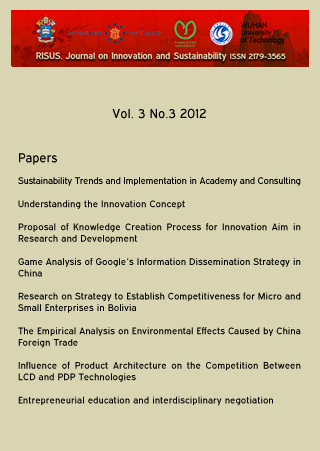Sustainability Trends and Implementation in Academy and Consulting
DOI:
https://doi.org/10.24212/2179-3565.2012v3i3p3-17Palavras-chave:
Sustainable development, Sustainability management, Trends in Brazilian marketResumo
Sustainable development and sustainable shareholder value gain are terms increasingly being worked in the academic and corporate worlds. Based on the Sustainable Shareholder Value Model, by Hart and Milstein (2004), along with research by Sgarbi et al (2008) and Telles (2011), this paper verifies and compares if the jargons from Sgarbi (2008) are being used by professors from PUC-SP and by professionals and consultants in Brazilian companies, in addition to verifying how these professionals and consultants classify these jargons for the next two decades. The conclusion shows that the distribution of jargons from Sgarbi (2008) over the quadrants by Hart and Milstein (2004) are balanced both by professors and by sustainability professionals and consultants. Both the future on the next two decades and the quadrant with highest frequency percentage are related to present topics, externally to the company.Downloads
Edição
Seção
Licença
Esta obra está licenciada sob uma licença Creative Commons Atribuição - No comercial - Sin derivaciones 4.0 Internacional
1.O(s) autor(es) autoriza(m) a publicação do artigo na revista;
2.O(s) autor(es) garante(m) que a contribuição é original e inédita e que não está em processo de avaliação em outra(s) revista(s);
3.A revista não se responsabiliza pelas opiniões, ideias e conceitos emitidos nos textos, por serem de inteira responsabilidade de seu(s) autor(es);
4.É reservado aos editores o direito de proceder ajustes textuais e de adequação do artigos às normas da publicação.
1.1 Copyright Statement
This journal is licensed under a Creative Commons Attribution-Non Commercial-No Derivers 4.0 International license.
1. The author (s) authorize the publication of the article in the journal;
2. The author (s) warrant that the contribution is original and unpublished and is not in the process of being evaluated in other journal (s);
3. The journal is not responsible for the opinions, ideas and concepts emitted in the texts, as they are the sole responsibility of its author (s);
4. The editors are entitled to make textual adjustments and to adapt the articles to the standards of publication.


